英语基础对话
初级日常英语对话 初级英语口语对话

初级日常英语对话初级英语口语对话情景对话是英语学习中不行或缺的一个环节。
师应尽可能地为同学设置一些语言活动情境,让同学在情境中培育爱好和自信念,猎取语言的学问,进而培育同学的语感和语言表达力量,以关心同学树立用英语思维、表达思想的习惯。
我细心收集了初级日常英语对话,供大家观赏学习!初级日常英语对话篇1Jolin: May I speak to Coco, please?请问Coco在吗?Coco: Coco is speaking!我就是。
Jolin: Its me, Jolin. I want to know whether you bought your wedding house.是我,Jolin. 我想知道你买婚房了没。
Coco: No, I didnt. Do you have any good news for me?The price is so high that I could not afford it.没有啊。
你有什么好消息吗?房价太高了,我负担不起呢。
Jolin: Do you want to buy a second-hand house? One of my friends, Tom, will go abroad and want to sell his house bought last year.你想买二手房吗?我一个伴侣,Tom,要到国外去,想卖掉他现在的房子。
这个房子是去年买的。
Coco: Oh, really? Please give me some details about thathouse.哦,真的吗?给我一些具体信息吧。
Jolin: That apartment includes one living room and two bed rooms. One bed room has a big balcony. Tom decorated the house last year, but now it still looks as nice and beautiful as completed.这是两室一厅的房子,其中一个卧房有个大阳台。
英语日常对话100句一问一答

英语日常对话100句一问一答1. Q: How are you today?A: I'm doing well, thanks. And you?2. Q: What's your name?A: My name is [Your Name].3. Q: Where are you from?A: I'm from [Your City/Country].4. Q: What do you do for a living?A: I work as a [Your Profession].5. Q: What's your favorite food?A: I really like pizza.6. Q: Do you like to travel?A: Yes, I love exploring new places.7. Q: Have you seen the latest movie?A: Not yet, is it any good?8. Q: What kind of music do you listen to?A: I enjoy listening to pop music.9. Q: How do you spend your weekends?A: I usually go hiking or spend time with friends.10. Q: Do you have any pets?A: Yes, I have a dog named [Pet's Name]. 11. Q: What's the weather like today?A: It's sunny and warm.12. Q: Do you like reading?A: Yes, I read a lot in my free time.13. Q: What's your favorite book?A: My favorite book is "To Kill a Mockingbird."14. Q: How do you get to work?A: I take the subway.15. Q: What time do you usually wake up?A: I wake up at 6:30 a.m.16. Q: Do you prefer coffee or tea?A: I'm a coffee person.17. Q: Have you been to [Famous Place]?A: Yes, I visited there last year.18. Q: What's your favorite color?A: I like blue the most.19. Q: Do you speak any other languages?A: Yes, I can speak Spanish.20. Q: What's your favorite season?A: I love autumn.... (Continuing the pattern)81. Q: Do you like to cook?A: Yes, I enjoy trying out new recipes.82. Q: What's your favorite sport?A: I enjoy playing basketball.83. Q: Do you have any siblings?A: Yes, I have a younger brother.84. Q: What's your favorite holiday?A: I look forward to Christmas every year.85. Q: Do you play any musical instruments?A: I play the guitar.86. Q: What's your favorite TV show?A: I'm currently watching "Stranger Things."87. Q: Do you like to go to the gym?A: Yes, I try to work out regularly.88. Q: What's your favorite type of cuisine?A: I'm a big fan of Italian food.89. Q: Do you enjoy shopping?A: Sometimes, but not too often.90. Q: What's your favorite quote?A: "The only way to do great work is to love what you do."91. Q: Do you prefer the countryside or the city?A: I prefer the peacefulness of the countryside.92. Q: What's your favorite subject in school?A: I always liked history.93. Q: Do you like to dance?A: Yes, especially to salsa music.94. Q: What's your dream vacation destination?A: I'd love to visit Japan.95. Q: Do you like to garden?A: Yes, I find it relaxing.96. Q: What's your favorite childhood memory?A: Going to the beach with my family.97. Q: Do you enjoy photography?A: Yes, it's a hobby of mine.98. Q: What's your favorite dessert?A: I can't resist chocolate cake.99. Q: Do you prefer to be indoors or outdoors?A: I prefer being outdoors when the weather is nice. 100. Q: What's your favorite thing to do on a rainy day?A: I like to curl up with a book and a cup of tea.。
简单英语对话英语简单对话两人十句

简单英语对话英语简单对话两人十句简单英语对话简单英语对话简单英语对话一:1.Mary,I am leaving you. Mary,我不等你了.2.It takes a little time. 需要一点时间.3.Can you keep an eye on my bag 帮我照看一下包好吗4.Absolutely! 绝对地;完全地Absolutely Don“t Study English. 《千万别学英语》5.Are you used to the food here 你习惯吃这儿的饭菜吗Are you used to the food here 你习惯吃这儿的饭菜吗The food here tastes mild, and I enjoy mild food. 这儿的饭菜口味淡。
我喜欢淡口味 6.It“s no big deal. 没什么大不了的。
7.Cheer up! 高兴起来,振作起来!Nobody can help you,you need to cheer up! 8.An eye for an eye. 以眼还眼An eye for an eye,a tooth for a tooth 以眼还眼,以牙还牙An eye for an eye makes the whole world blind! 以眼还眼,世界只会更加盲目! 9.Actions speak louder than words. 行动胜于空谈. Don"t tell me how to do this;show me! Actions speak louder than words 不要(只是)告诉我怎么做,做给我看!行动胜于空谈10.Long time no see. 好久不见! 简单英语对话二:Welcome to our hotel,miss Henry. 欢迎来到我们酒店,享利小姐。
It’s no big deal. 没什么大不了的。
简单日常英语口语对话(详细版)

★频道为友整理的《简单⽇常英语⼝语对话(详细版)》,供⼤家参考学习。
1、⽇常英语⼝语对话-接电话 喂!我是汤姆。
Hello! This is Tom。
我就是。
This is him。
哪位?Who’s speaking? 请稍等,我看他在不在。
Hang on a moment, please. I’ll see if he’s in。
莉莉,有你的电话。
Lily, there’s a phone call for you。
抱歉,他不在。
Sorry, he’s out。
他现在正忙着呢。
He is tied up right now。
对不起,让你久等了。
I’m sorry to have kept you waiting。
我把电话给你转过去。
Let me transfer your call。
你要跟谁通话?Who do you want to talk to? Answering the Telephone Linda:Hello! Who is speaking? John:Hello! This is John. I want to speak to Linda。
Linda:This is her。
John: Hi, Linda. I’m just calling to invite you to a dinner party tomorrow evening。
Linda:Really? What time and where? John: 7:30 pm, at Longding Chinese restaurant. I’ll be at your place at 7:00 to pick you up if you need a ride。
Linda:Yes, please. I’ll need a ride. I’ll be waiting for you then。
英语基本对话1000句精选,日常必备!

英语基本对话1000句精选,⽇常必备!英语基本上对话1000句应⽤于⽇常⽣活各个领域,能够让你学会在不同的场合运⽤不同的语句来进⾏顺畅的交流,同时也能帮助⾃⼰脱离哑巴⼝语状态,要想交流⽆障碍,学好英语基本对话1000句是前提,本⽂精选常⽤、实⽤以及⽣活必备的英语基本对话句⼦.第⼀、使⽤最频繁的常⽤英语对话句⼦1. I see.我明⽩了。
2. I quit! 我不⼲了!3. Let go! 放⼿!4. Me too.我也是。
5. My god! 天哪!6. No way! 不⾏!7. Come on.来吧(赶快)8. Hold on.等⼀等。
9. I agree。
我同意。
10. Not bad.还不错。
11. Not yet.还没。
12. See you.再见。
13. Shut up! 闭嘴!14. So long.再见。
15. Why not? 好呀! (为什么不呢?)16. Allow me.让我来。
17. Be quiet! 安静点!18. Cheer up! 振作起来!19. Good job! 做得好!20. Have fun! 玩得开⼼!21. How much? 多少钱?22. I'm full.我饱了。
23. I'm home.我回来了。
24. I'm lost.我迷路了。
25. My treat.我请客。
26. So do I.我也⼀样。
27. This way。
这边请。
28. After you.您先。
29. Bless you! 祝福你!30. Follow me.跟我来。
31. Forget it! 休想! (算了!)32. Good luck! 祝好运!33. I decline! 我拒绝!34. I promise.我保证。
35. Of course! 当然了!36. Slow down! 慢点!37. Take care! 保重!38. They hurt. (伤⼝)疼。
英语日常口语对话150句
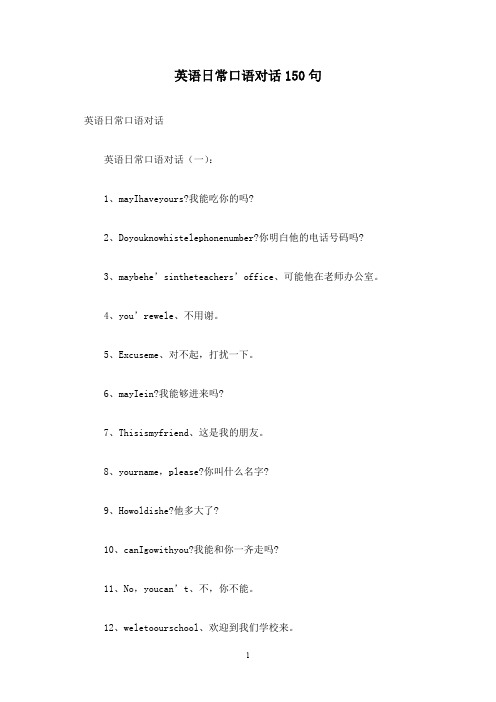
英语日常口语对话150句英语日常口语对话英语日常口语对话(一):1、mayIhaveyours?我能吃你的吗?2、Doyouknowhistelephonenumber?你明白他的电话号码吗?3、maybehe’sintheteachers’office、可能他在老师办公室。
4、you’rewele、不用谢。
5、Excuseme、对不起,打扰一下。
6、mayIein?我能够进来吗?7、Thisismyfriend、这是我的朋友。
8、yourname,please?你叫什么名字?9、Howoldishe?他多大了?10、canIgowithyou?我能和你一齐走吗?11、No,youcan’t、不,你不能。
12、weletoourschool、欢迎到我们学校来。
13、canIhelpyou?我能帮你吗?14、Hi,…喂,你好。
15、Howdoyoudo?你好。
16、Ilike…verymuch、我十分喜欢…。
17、That’sallright、没关系。
18、Sorry,Idon’tknow、对不起,我不明白。
19、you’rewrong、你错了。
20、canIhavetwocakes?我能吃两个蛋糕吗?21、Goodbye、再见22、Havesomebananas,please、请吃些香蕉。
23、Notbad,thankyou、不错,多谢。
24、yes,adressformydaughter、是的,给我女儿买条裙子25、Thankyou。
/Thanks、多谢。
26、Fine,thankyou/thanks、我很好,多谢。
27、Thisismiss/mr/mrs…这位是…小姐/先生/女士。
28、canIhaveone,please?我能吃一个吗?29、yes、I’msure、是的,我肯定。
30、I’msorry、对不起。
31、Howareyou?你这天早晨/下午/晚上好吗?32、Goodnight、晚安。
英语日常口语对话150句

英语日常口语对话150句英语日常口语对话英语日常口语对话(一):1、mayIhaveyours?我能吃你的吗?2、Doyouknowhistelephonenumber?你明白他的电话号码吗?3、maybehe’sintheteachers’office、可能他在老师办公室。
4、you’rewele、不用谢。
5、Excuseme、对不起,打扰一下。
6、mayIein?我能够进来吗?7、Thisismyfriend、这是我的朋友。
8、yourname,please?你叫什么名字?9、Howoldishe?他多大了?10、canIgowithyou?我能和你一齐走吗?11、No,youcan’t、不,你不能。
12、weletoourschool、欢迎到我们学校来。
13、canIhelpyou?我能帮你吗?14、Hi,…喂,你好。
15、Howdoyoudo?你好。
16、Ilike…verymuch、我十分喜欢…。
17、That’sallright、没关系。
18、Sorry,Idon’tknow、对不起,我不明白。
19、you’rewrong、你错了。
20、canIhavetwocakes?我能吃两个蛋糕吗?21、Goodbye、再见22、Havesomebananas,please、请吃些香蕉。
23、Notbad,thankyou、不错,多谢。
24、yes,adressformydaughter、是的,给我女儿买条裙子25、Thankyou。
/Thanks、多谢。
26、Fine,thankyou/thanks、我很好,多谢。
27、Thisismiss/mr/mrs…这位是…小姐/先生/女士。
28、canIhaveone,please?我能吃一个吗?29、yes、I’msure、是的,我肯定。
30、I’msorry、对不起。
31、Howareyou?你这天早晨/下午/晚上好吗?32、Goodnight、晚安。
日常英语口语900句大全 常用英语口语基本对话

日常英语口语900 句大全常用英语口语基本对话
英语中有很多常用的基本对话是可以提前记忆的,背诵一些日常交际口语对英语的学习也很有帮助。
1 日常英语口语基本用句1. What’s this? 这是什幺?
2. That’s a book. 那是一本书。
3. Is this your book? 这是你的书吗?
4. No,that’s not my book. 不,那不是我的书。
5. Whose book is this? 这是谁的书?
6. That’s your book. 那是你的书。
7. And what’s that? 还有那是什幺?
8. Is that a book? 那是一本书吗?
9. No,it isn’t. 不,不是。
10. It’s a pencil. 那是一枝铅笔。
11. Is it yours? 它是你的吗?
12. Yes,it’s mine. 是,是我的。
13. Where’s the door?门在哪儿?
14. There it is.门在那儿。
15. Is this book his?这本书是他的吗?
16. What are these? 这些是什幺?
17. Those are books. 那些是书。
18. Where are the books? 那些书在哪儿?
19. There they are. 在那儿。
常用英语口语900句基本对话
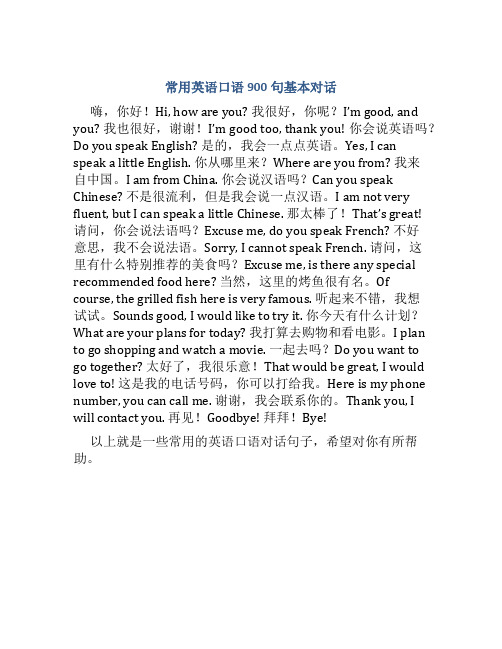
常用英语口语900句基本对话嗨,你好!Hi, how are you? 我很好,你呢?I’m good, and you? 我也很好,谢谢!I’m good too, thank you! 你会说英语吗?Do you speak English? 是的,我会一点点英语。
Yes, I can speak a little English. 你从哪里来?Where are you from? 我来自中国。
I am from China. 你会说汉语吗?Can you speak Chinese? 不是很流利,但是我会说一点汉语。
I am not very fluent, but I can speak a little Chinese. 那太棒了!That’s great!请问,你会说法语吗?Excuse me, do you speak French? 不好意思,我不会说法语。
Sorry, I cannot speak French. 请问,这里有什么特别推荐的美食吗?Excuse me, is there any special recommended food here? 当然,这里的烤鱼很有名。
Of course, the grilled fish here is very famous. 听起来不错,我想试试。
Sounds good, I would like to try it. 你今天有什么计划?What are your plans for today? 我打算去购物和看电影。
I plan to go shopping and watch a movie. 一起去吗?Do you want to go together? 太好了,我很乐意!That would be great, I would love to! 这是我的电话号码,你可以打给我。
Here is my phone number, you can call me. 谢谢,我会联系你的。
英语口语对话
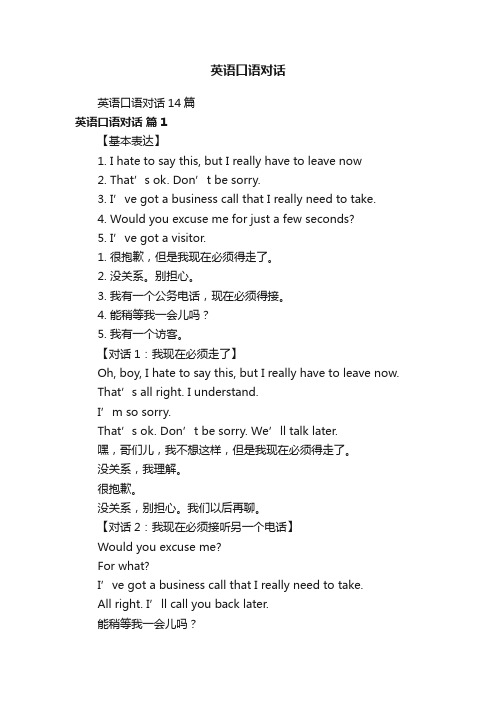
英语口语对话英语口语对话14篇英语口语对话篇1【基本表达】1. I hate to say this, but I really have to leave now2. That’s ok. Don’t be sorry.3. I’ve got a business call that I really need to take.4. Would you excuse me for just a few seconds?5. I’ve got a visitor.1. 很抱歉,但是我现在必须得走了。
2. 没关系。
别担心。
3. 我有一个公务电话,现在必须得接。
4. 能稍等我一会儿吗?5. 我有一个访客。
【对话1:我现在必须走了】Oh, boy, I hate to say this, but I really have to leave now.That’s all right. I understand.I’m so sorry.That’s ok. Don’t be sorry. We’ll talk later.嘿,哥们儿,我不想这样,但是我现在必须得走了。
没关系,我理解。
很抱歉。
没关系,别担心。
我们以后再聊。
【对话2:我现在必须接听另一个电话】Would you excuse me?For what?I’ve got a business call that I really need to take.All right. I’ll call you back later.能稍等我一会儿吗?为什么?我有一个公务电话,现在必须得接。
好的。
我一会儿再打给你。
英语口语对话篇2Tom:They all say it's hard to please everyone, but this…wow!We love it!May:Thank you.Tom:I'll have to get your recipe.May:No way! I'm keeping it to myself, and will cook it for my children. I'll be the mom that makes the world's best chocolate cake.英语口语对话篇3爸爸说期末考试得满分,他给你买奖品,他说:我保证。
简单英语对话100句
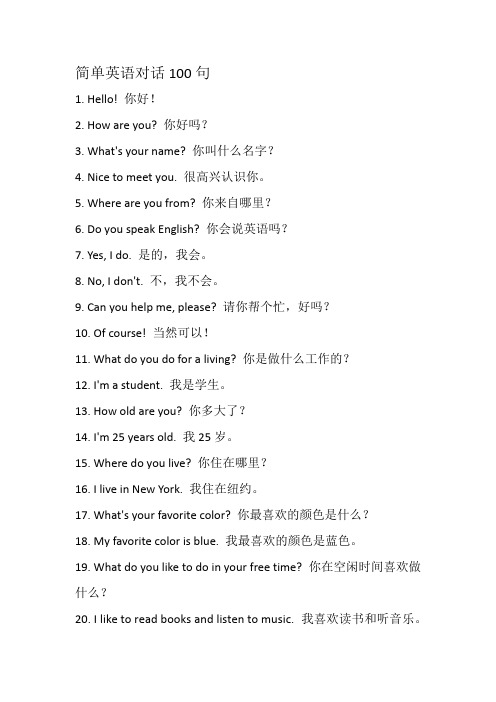
简单英语对话100句1. Hello! 你好!2. How are you? 你好吗?3. What's your name? 你叫什么名字?4. Nice to meet you. 很高兴认识你。
5. Where are you from? 你来自哪里?6. Do you speak English? 你会说英语吗?7. Yes, I do. 是的,我会。
8. No, I don't. 不,我不会。
9. Can you help me, please? 请你帮个忙,好吗?10. Of course! 当然可以!11. What do you do for a living? 你是做什么工作的?12. I'm a student. 我是学生。
13. How old are you? 你多大了?14. I'm 25 years old. 我25岁。
15. Where do you live? 你住在哪里?16. I live in New York. 我住在纽约。
17. What's your favorite color? 你最喜欢的颜色是什么?18. My favorite color is blue. 我最喜欢的颜色是蓝色。
19. What do you like to do in your free time? 你在空闲时间喜欢做什么?20. I like to read books and listen to music. 我喜欢读书和听音乐。
21. Have you been to any foreign countries? 你去过其他国家吗?22. Yes, I have been to France and Italy. 是的,我去过法国和意大利。
23. What's your favorite food? 你最喜欢的食物是什么?24. My favorite food is pizza. 我最喜欢的食物是比萨。
英语基础口语对话带翻译
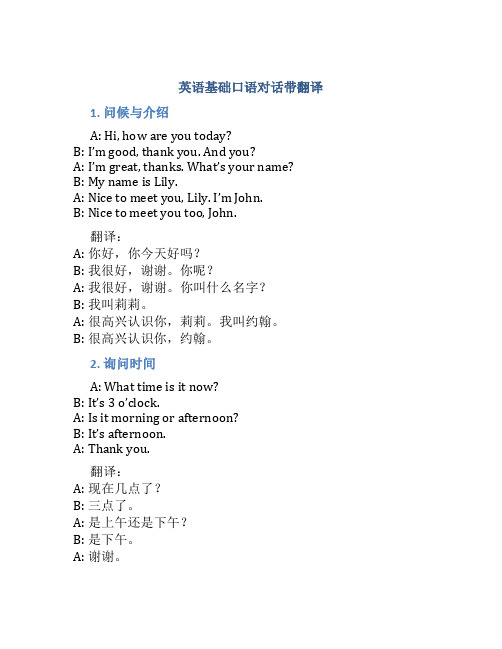
英语基础口语对话带翻译1. 问候与介绍A: Hi, how are you today?B: I’m good, thank you. And you?A: I’m great, thanks. What’s your name?B: My name is Lily.A: Nice to meet you, Lily. I’m John.B: Nice to meet you too, John.翻译:A: 你好,你今天好吗?B: 我很好,谢谢。
你呢?A: 我很好,谢谢。
你叫什么名字?B: 我叫莉莉。
A: 很高兴认识你,莉莉。
我叫约翰。
B: 很高兴认识你,约翰。
2. 询问时间A: What time is it now?B: It’s 3 o’clock.A: Is it morning or afternoon?B: It’s afternoon.A: Thank you.翻译:A: 现在几点了?B: 三点了。
A: 是上午还是下午?B: 是下午。
A: 谢谢。
3. 询问地址A: Excuse me, where is the nearest supermarket? B: There is one on Main Street, just two blocks away. A: Thank you very much.B: You’re welcome.翻译:A: 对不起,请问最近的超市在哪里?B: Main Street上有一个,离这里只有两个街区远。
A: 非常感谢。
B: 不客气。
4. 谈论天气A: It’s raining heavily today.B: Yes, the weather forecast said it would rain.A: I hope it clears up soon.B: Me too, I don’t like the rain.翻译:A: 今天下大雨。
B: 是的,天气预报说会下雨。
[简单英语日常口语对话]英语基本对话1000句
![[简单英语日常口语对话]英语基本对话1000句](https://img.taocdn.com/s3/m/0e99540c551810a6f4248678.png)
[简单英语日常口语对话]英语基本对话1000句简单英语日常口语对话简单英语日常口语对话开设英语对话课的最终目的是培养学生的英语运用能力。
教师应将传统教学法和交际教学法有机结合,注重培养学生语言能力,讲究语言环境的创设,重视交际策略的运用,以提高其交际能力。
小编精心收集了简单英语日常口语对话,供大家欣赏学习! 简单英语日常口语对话 1 Vicky: What are you working on 女:你在忙什么呢Issac: If I tell you, will you promise not to laugh 男:如果我告诉你,你不准笑我Vicky: All right. What is it 女:行,你说吧Issac: It’s a love letter to Julie. 男:这是给朱丽的情书Vicky: Isn’t it a little premature You’ve only been going out for a month. 女:你们发展的太快了吧。
你们相处也就一个月吧Issac: Maybe, but I really want her to know how I feel. 男:也许吧,不过我真想让她知道我的感受V icky: Let me see it. “Dear Julie. I’m writing this letter to pour my heart out to you. When we met, it was love at first sight and I can’t get you out of my head. You mean everything to me. Now that we’re together, how can I ever live without you” 女:让我看看。
“亲爱的朱丽,我给你写这封信就是想向你倾诉。
遇见你,我一见钟情,你的形象萦绕在我心中挥之不去。
日常简单英语口语对话【四篇】

【导语】其实和外国⼈交流并不需要那么专业的英语⽔平,⼏句⽇常⽤语⾜矣!只要掌握以下语句,就能解决很多问题。
下⾯是由⽆忧考整理的关于⽇常简单英语⼝语对话【四篇】,⼀起来了解下吧!【篇⼀】⽇常简单英语⼝语对话Jane: Good game?Jane:⽐赛还好吗?Bob: Not bad. Bit too hot for me today.Bob:还不错。
我觉得今天太热了。
Jane: Yes, I know. Kind of hard to concentrate, isn't it?Jane:是啊,我知道。
有点难以定下⼼来,对吧?Bob: Absolutely. Who were you playing with?Bob:没错。
你跟谁⼀起打球?Jane: Oh, just on my own. I just joined, so I don't really have any partners.Jane:噢,我⾃⼰打。
因为我才刚加⼊,所以我连个球伴都没有。
Bob: Really? Oh, well in that case we should play together some time. What's your handicap?Bob:真的吗?噢,要是这样的话,我们应该找个时间⼀起打。
你的差点是多少?Jane: 16. Yours?Jane:16。
你呢?Bob: No kidding! I'm 16, too. We should definitely play together some time. My name's Bob.Bob:不盖你!我也是16。
我们⼀定要找个时间⼀起打球。
我是Bob.Jane: Jane. Nice to meet you.Jane:我是Jane,很⾼兴认识你。
Bob: Me too. So, do you like the course?Bob:我也是。
英语零基础常用对话

英语零基础常用对话一、问候与介绍1.Hello,how are you?你好,最近怎么样?2.Nice to meet you.很高兴认识你。
3.I'm new here.我是新来的。
4.Can you introduce yourself?你能自我介绍一下吗?5.My name is[Name],I'm from[City/Country].我叫[名字],来自[城市/国家]。
二、谈论天气6.It's a beautiful day,isn't it?天气真好啊,不是吗?7.It's really sunny today.今天真的很晴朗。
8.It's raining outside.外面下雨了。
9.It's a bit chilly today,isn't it?今天有点冷,不是吗?10.It's really hot today,don't you think?今天真的很热,你不觉得吗?三、日常活动安排11.What time do you get up every day?你每天几点起床?12.I usually wake up at 7 am.我通常7点起床。
13.What do you do after work?你下班后做什么?14.I like to read books in my free time.我空闲时间喜欢读书。
15.Do you have any plans for the weekend?你周末有什么计划吗?四、表达感谢16.Thank you very much for your help.非常感谢你的帮助。
17.I appreciate your assistance.我很感激你的帮助。
18.Thank you for your kindness.谢谢你的好意。
19.I'm grateful for your support.我很感激你的支持。
日常英语口语的对话句子
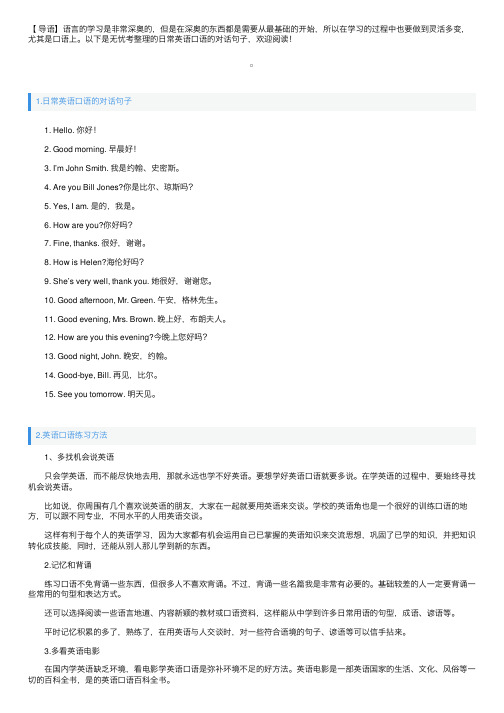
【导语】语⾔的学习是⾮常深奥的,但是在深奥的东西都是需要从最基础的开始,所以在学习的过程中也要做到灵活多变,尤其是⼝语上。
以下是⽆忧考整理的⽇常英语⼝语的对话句⼦,欢迎阅读!1.⽇常英语⼝语的对话句⼦ 1. Hello. 你好! 2. Good morning. 早晨好! 3. I’m John Smith. 我是约翰、史密斯。
4. Are you Bill Jones?你是⽐尔、琼斯吗? 5. Yes, I am. 是的,我是。
6. How are you?你好吗? 7. Fine, thanks. 很好,谢谢。
8. How is Helen?海伦好吗? 9. She’s very well, thank you. 她很好,谢谢您。
10. Good afternoon, Mr. Green. 午安,格林先⽣。
11. Good evening, Mrs. Brown. 晚上好,布朗夫⼈。
12. How are you this evening?今晚上您好吗? 13. Good night, John. 晚安,约翰。
14. Good-bye, Bill. 再见,⽐尔。
15. See you tomorrow. 明天见。
2.英语⼝语练习⽅法 1、多找机会说英语 只会学英语,⽽不能尽快地去⽤,那就永远也学不好英语。
要想学好英语⼝语就要多说。
在学英语的过程中,要始终寻找机会说英语。
⽐如说,你周围有⼏个喜欢说英语的朋友,⼤家在⼀起就要⽤英语来交谈。
学校的英语⾓也是⼀个很好的训练⼝语的地⽅,可以跟不同专业,不同⽔平的⼈⽤英语交谈。
这样有利于每个⼈的英语学习,因为⼤家都有机会运⽤⾃⼰已掌握的英语知识来交流思想,巩固了已学的知识,并把知识转化成技能,同时,还能从别⼈那⼉学到新的东西。
2.记忆和背诵 练习⼝语不免背诵⼀些东西,但很多⼈不喜欢背诵。
不过,背诵⼀些名篇我是⾮常有必要的。
基础较差的⼈⼀定要背诵⼀些常⽤的句型和表达⽅式。
简单的英语口语交际对话(通用40篇)
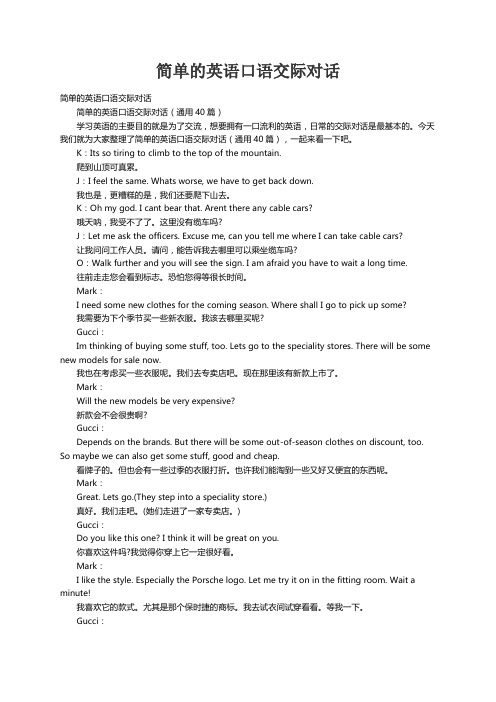
简单的英语口语交际对话简单的英语口语交际对话简单的英语口语交际对话(通用40篇)学习英语的主要目的就是为了交流,想要拥有一口流利的英语,日常的交际对话是最基本的。
今天我们就为大家整理了简单的英语口语交际对话(通用40篇),一起来看一下吧。
K:Its so tiring to climb to the top of the mountain.爬到山顶可真累。
J:I feel the same. Whats worse, we have to get back down.我也是,更糟糕的是,我们还要爬下山去。
K:Oh my god. I cant bear that. Arent there any cable cars?哦天呐,我受不了了。
这里没有缆车吗?J:Let me ask the officers. Excuse me, can you tell me where I can take cable cars?让我问问工作人员。
请问,能告诉我去哪里可以乘坐缆车吗?O:Walk further and you will see the sign. I am afraid you have to wait a long time.往前走走您会看到标志。
恐怕您得等很长时间。
Mark:I need some new clothes for the coming season. Where shall I go to pick up some?我需要为下个季节买一些新衣服。
我该去哪里买呢?Gucci:Im thinking of buying some stuff, too. Lets go to the speciality stores. There will be some new models for sale now.我也在考虑买一些衣服呢。
我们去专卖店吧。
现在那里该有新款上市了。
Mark:Will the new models be very expensive?新款会不会很贵啊?Gucci:Depends on the brands. But there will be some out-of-season clothes on discount, too. So maybe we can also get some stuff, good and cheap.看牌子的。
英语基本对话【英语对话范文带翻译】

英语基本对话【英语对话范文带翻译】英语对话范文带翻译英语对话范文带翻译英语对话范文带翻译一Maria:Daddy, what“s next What else do we do now 爸爸,接下来做什么现在我们还能玩点什么呢Benjamin:There is a man-made fishing pond nearby. So, What do you think of going fishing there 这附近有一个人工渔场。
那么,你觉得我们去那里钓鱼怎么样Maria:Great. Let“s go. Where is it 太好了。
我们走吧。
它在哪里啊Benjamin:Patience, boy. A watched pot never boils. We shall get out fishing stuff first and make some baits, too. 孩子,耐心点。
心急吃不到热豆腐。
我们得先去拿渔具,还要准备好鱼饵啊。
Maria:We have many cookies left here. Can we use them as baits 我们还剩了很多曲奇。
我们能用它们当鱼饵吗Benjamin:I don"t think fish would like them. Instead, they love earth worms.我觉得鱼儿不会喜欢吃那个。
不过,它们很喜欢吃蚯蚓。
Maria:So let"s go and catch earth worms! 那我们去抓些蚯蚓吧。
Benjamin:OK. (After a short while, they"ve caught many earth worms.) I think that"s enough for today. Let"s go. 行啊。
(没过多久,他们就抓到了很多蚯蚓。
简单日常英语对话100句
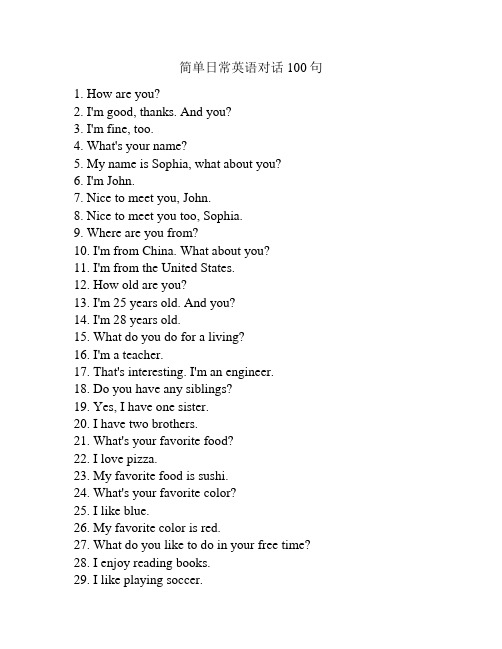
简单日常英语对话100句1. How are you?2. I'm good, thanks. And you?3. I'm fine, too.4. What's your name?5. My name is Sophia, what about you?6. I'm John.7. Nice to meet you, John.8. Nice to meet you too, Sophia.9. Where are you from?10. I'm from China. What about you?11. I'm from the United States.12. How old are you?13. I'm 25 years old. And you?14. I'm 28 years old.15. What do you do for a living?16. I'm a teacher.17. That's interesting. I'm an engineer.18. Do you have any siblings?19. Yes, I have one sister.20. I have two brothers.21. What's your favorite food?22. I love pizza.23. My favorite food is sushi.24. What's your favorite color?25. I like blue.26. My favorite color is red.27. What do you like to do in your free time?28. I enjoy reading books.29. I like playing soccer.30. How was your day?31. It was good, thank you. How about yours?32. It was a bit tiring.33. What are your hobbies?34. I enjoy playing the guitar.35. I love swimming.36. What's the weather like today?37. It's sunny and warm.38. It's cloudy and rainy.39. What time is it?40. It's 7 o'clock.41. Is there a bank near here?42. Yes, there's a bank on the next street.43. Excuse me, can you help me find the nearest supermarket?44. Sure, just go straight ahead, and you'll see it on your left.45. How do I get to the train station from here?46. Take a right at the second intersection, and it'll be on your left.47. Where is the nearest restroom?48. It's on the ground floor, next to the elevator.49. How much does this cost?50. It's $10.51. Can I pay by credit card?52. Sure, we accept credit cards.53. Do you have a menu in English?54. Yes, here you go.55. What's the wifi password?56. It's "guest123".57. Can I have a glass of water, please?58. Of course, here you go.59. What's your phone number?60. It's 123-456-7890.61. Can I have your email address?62.Sure,it'******************.63. Do you have any recommendations?64. I would recommend the seafood pasta.65. What's your favorite movie?66. I love "The Shawshank Redemption".67. Can you help me with my homework?68. I'm sorry, I'm not very good at that subject.69. Where did you go on vacation?70. I went to Thailand.71. How was your trip?72. It was amazing! I had a great time.73. Can you tell me a joke?74. Sure, why don't scientists trust atoms?75. Because they make up everything!76. What's your favorite book?77. I really enjoyed "To Kill a Mockingbird".78. How do you say "hello" in French?79. It's "bonjour".80. Have you been to the Eiffel Tower?81. No, I haven't had the chance yet.82. What's the capital of Australia?83. It's Canberra.84. Have you ever been there?85. Yes, I visited last year.86. Do you have any pets?87. Yes, I have a dog named Max.88. What's your dog's breed?89. He's a golden retriever.90. What's your favorite season?91. I love autumn.92. What's your dream job?93. I would love to be a pilot.94. Do you like to travel?95. Yes, I love exploring new places.96. Do you have any plans for the weekend?97. I'm going hiking with some friends.98. Would you like to join us?99. That sounds fun, I would love to. 100. Have a great day!。
- 1、下载文档前请自行甄别文档内容的完整性,平台不提供额外的编辑、内容补充、找答案等附加服务。
- 2、"仅部分预览"的文档,不可在线预览部分如存在完整性等问题,可反馈申请退款(可完整预览的文档不适用该条件!)。
- 3、如文档侵犯您的权益,请联系客服反馈,我们会尽快为您处理(人工客服工作时间:9:00-18:30)。
In English, as in other languages, one of the best ways to insult someone is to describe them as common animals. Following are some common ones, but be careful how and when you use them!
I have the basics down.
我有些底子。
2) Customary(惯例): following the traditions of business and culture
It is customary to say your name as you shake someone's hand for the first time.
在英语中,就像其他的语言,侮辱别人最好的办法之一也是把他形容为某种动物。下面就是一些常见的说法。但何时及怎么使用它们你可要小心!
Chicken: a person who lacks courage
Cold fish: a dull and uninteresting person. Also used to describe a weak handshake
永远不要说:“OK”。说“OK”粗鲁,而且它是表达肯定意思的一种比较弱的说法。如果只说“OK”意味着你并不感兴趣或你并没有真正明白。
2) It is customary to never say "yes" when you mean no. If someone asks you if you understand (and you don't understand), don't say, "Yes, yes, yes." It is better to say, "sorry, I don't understand."
如果你的意思是“是”,那就千万别说“No”。如果你的老板问你,你是不是个好员工,你要说“是”。如果你的朋友给你水喝,而你又口渴,就说“是”。这和中国不同,西方人只问一次。
4) When you talk with someone, never look away from their face. Try looking into their eyes, that is customary and polite. Keep eye contact at all times. Smiling a little always helps.
Coyote: an ugly person
Dog: a worthless person or an ugly woman
Egg-head: a smart, but dull, person
Fox: an attractive woman
Go Ape: to get very excited about something
Finish packing your suitcase so we can get going.
把你的手提箱准备好,我们就可以出发了。
5) Procrastinate (耽搁、推迟): delay, would never procrastinate when it comes top studying for a test.
动物:形容一个人的行为跟野兽似的。
My brother is a real animal because he leaves his dirty clothes lying on the bedroom floor.
我的哥哥可真是动物,因为他把脏衣服放在卧室的地板上。
Toady's seminar deals with learning about customer relations.
今天的研讨会主要是学习如何处理与消费者的关系。
5) Workshop(学习小组): a hands-on group learning session
第一次见面握对方手的同时介绍自己的名字是一种惯例。
3) Chicken(胆小鬼、懦夫): afraid, a coward
He was a chicken, so he ran away from the beautiful girl.
他是个胆小鬼,所以他在漂亮女孩面前跑掉了。
Goose: an idiot or stupid person
小鸡:没有勇气的人,懦夫
冷鱼:冷冰冰缺乏热情的人。也可以形容握手的时候很软,没有劲道
山狗:很丑的人
狗:没用的人或丑女人
蛋头:很聪明但没什么意思、呆瓜,书呆子
狐狸:有魅力的女人
如果你要表达否定的意思,习惯的做法就是永远也不要说“yes”。如果有人问你是不是真明白了,(而你又不明白),不要说“Yes, yes, yes”(是,是,是),还不如说“对不起,我不明白”。
3) Never say "no" when you mean yes. If your boss asks if you think you are a good worker, say "yes". If your friend offers you some water, and you are thirsty, say "yes". Unlike in China, Westerners will only ask once.
2) Objectives(目标): goals, plans for the future
My objective is to find a job where the office manager isn't such a jerk.
我的目标是找这样一份老板不是这样一个笨蛋的工作。
永远不要耽误学习重要的准备考试。
6) Yeah right (没有、不可能): no, now way.
Bill is a good boy. Yeah right!
比尔是个好男孩儿。不可能!
1) Culture shock (文化冲击,为文化的差异而感到震惊): being amazed at the diverences in culture
喝醉了的
If you get smashed, you should not drive your car. Catch a cab instead.
如果你喝醉了酒就不应该开车了。应该打的。
3) Dirty rat: slang for a bad person
有一个昼夜营业的商店是很方便的。
2) I swear (我发誓,我保证): I promise
I swear to tell the truth, the whole truth, and nothing but the truth.
我发誓说出真相,整个真相,完完全全的真相。
当你与别人说话时千万不要把目光从他/她的脸上移开。试着看着对方的眼睛。这是一种惯例也是一种礼貌。要一直进行目光交流。微笑也很有帮助。
1) Convenient (方便、便捷): easy, quick
Have a store that is open 24 hours a day is very convenient.
Can you help me deal with getting a visa?
像猿人似的:对某件事非常兴奋、激动
鹅:白痴或笨蛋
1) Innovative(创新的): creative with new fresh ideas
That is a very innovative training course.
这项培训课程是很有创新。
1) Ace: the best, top
一流的,最好的
If I ace this test, I will be first in the class for the year.
如果这次测验我能考好的话,我就是本年度班级的第一名了。
2) Smashed: drunk
3) Predominatly(重要的,主要的): mostly, usually
The class is predominatly made up of girls.
这堂课主要是为女孩子设计的。
4) Seminar(研讨会): short training course
和面试你的人交谈时,要一直面向他/她,并保持目光交流。
5) Handle it(处理,解决): deal with it, control it
Can you handle driving a car for seven hours straight?
你能连开7个小时车吗?
4) Eye contact(目光交流): looking into each other's eyes
While you talk with the interviewer, always face him or her and keep eye contact at all times.
1) Never say "ok". It is rude and it is a weak way to say "yes". Saying only "Ok" shows that you are not interested or that you don't really understand.
